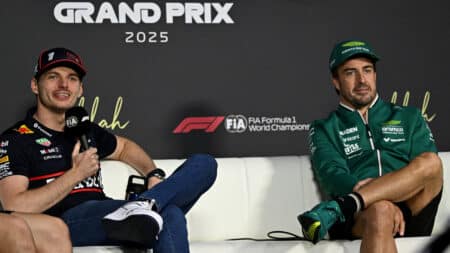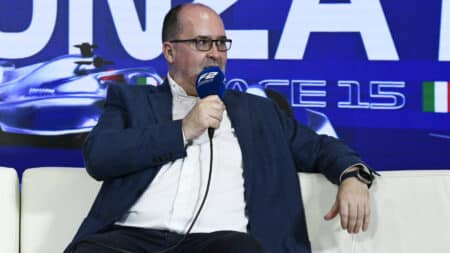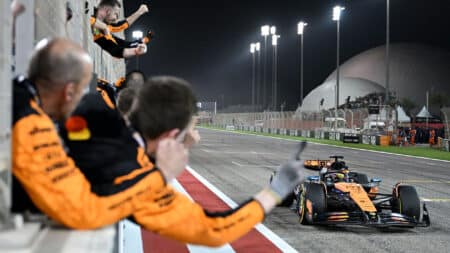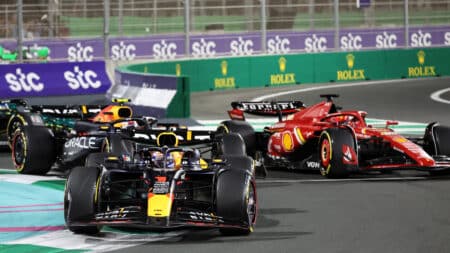
Alonso: Verstappen not a threat to my Aston Martin F1 seat
Fernando Alonso says it's "very unlikely" Max Verstappen will be his team-mate, and rejected the idea that he could be replaced by the Dutchman
We’ve dug out and digitised Rob Widdows’ old tapes from when he presented a show called Track Torque on Radio Victory in the late 1970s and early ’80s. The first in the series is an hour-long chat he had with Lord Hesketh in 1979. Here’s an extract. If you buy the full recording (only £1.99) you get 10 minutes of Nelson Piquet explaining the step up to Formula 1.
Click here to buy the lead image.
Rob Widows: How did you get involved with James Hunt and arrive in Grand Prix racing?
Lord Hesketh: The first race we ever did was at Thruxton in, I think, April 1972 with Bubbles driving. Bubbles decided that Formula 3 had become a great deal quicker than when he had been doing it five or six years before that. As a result he promoted himself to team manager and got a charming man called Steve Thompson to drive the car at Monaco which was the first very tough event we had to go to because we had to qualify.
At the following race meeting Bubbles was back driving the car at a place called Chimay in Belgium and I only turned up at the end of the last practice and Bubbles had managed to blow up two engines without doing the necessary five laps to get the qualifying money and he said, “Well, I am now full-time team manager and I have found this starving youth who is very keen to drive racing cars.” It turned out to be a young man called James Hunt who was literally starving at the time. His world assets were about 25 quid and a Mini on the drip.
We signed there and then the only contract we ever had with him which was in fact signed on the back of a beer mat in a café in Belgium. I’ve always been rather pleased and proud of that. We never had the kind of contractual difficulties that you read about in the newspapers in not only car racing but football or any other sport.
Want to listen to the full show? Click here.
RW: Did you immediately like James Hunt as a person? Was that part of why you did contact him?
LH: Well there’s always been a rumour that Hesketh Racing was such a joke that no one would drive for them and James Hunt had such a reputation for crashing cars that no one would hire him to drive and so as a result we were thrown into each other. I think that that is to be taken with a grain of salt so to speak. I think that fundamentally there was a tremendous rapport between Bubbles and James which was to last for a considerable number of seasons and I think still exists today. There was an essential understanding, an unsaid understanding, which meant that James and Bubbles were able to fuse together to create a unique and very successful combination within certain parameters.
RW: There was a lot of talk in the press in those days about Hesketh Racing being as you’ve just described it as a joke. Did that worry you? Did it upset you that journalists used to talk about it as a joke because it obviously wasn’t a joke was it?
LH: Well, on one hand it upset me. On the other I think it’s probably the greatest advantage we ever had. I think that in all honesty the journalists and other people who’d decried Hesketh Racing as a joke – which was perfectly reasonable in some ways – caused some of our success. Because what they wrote changed my personal approach and my financial commitment, which was very important from merely being a benign sponsor, happy possibly to stay even in Formula 3 or possibly look at Formula 2, into aggressively desiring to succeed in order to prove, probably foolishly, a small minority wrong.
RW: Had you not been Lord Hesketh with everything that surrounds you would you be saying the same things? I mean had you been born a different person would you have had these ambitions do you think?
LH: Well, I think that being Lord Hesketh was a severe disadvantage because I think that no one took one seriously. They immediately put one into a sort of pigeon hole. It’s remarkable how unperceptive people are. I mean the minute you turn up at a race track, because one’s got a title, one’s immediately dismissed as some sort of crack pot. The only reward I get out of that is that I suppose it’s rewarding to be a successful crack pot compared with being an unsuccessful serious person.

Fernando Alonso says it's "very unlikely" Max Verstappen will be his team-mate, and rejected the idea that he could be replaced by the Dutchman

Former FIA second-in command Robert Reid has expanded on the reasons behind his exit, saying that he was excluded after raising concerns over "fundamental principles" such as transparency and accountability

There's several key differentiators that could help you win big in F1 Fantasy for this weekend's 2025 Saudi Arabian GP. Here are our predictions; tips on drivers to avoid; which chips to play and further analysis

Can Red Bull rebound from its poor Bahrain showing? And will it be Piastri or Norris leading McLaren's charge? Here's the five themes to watch for at the Saudi Arabian GP